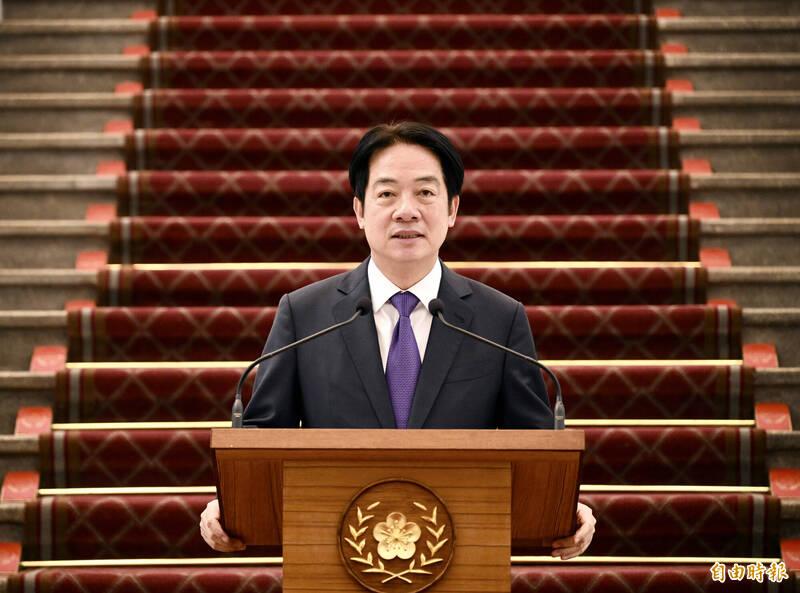President William Lai (賴清德) today announced three key priorities regarding national defense spending, national security laws and economic restructuring following a high-level national security meeting this morning.
Lai convened a national security meeting with Premier Cho Jung-tai (卓榮泰), National Security Council Secretary-General Joseph Wu (吳釗燮) and other senior officials to discuss the US’ shifting trade policies and national security threats.
The first priority is to continue advancing defense reforms to demonstrate Taiwan’s commitment to national defense, Lai said.

Photo: Lo Pei-de, Taipei Times
The government would promote a special budget to ensure national defense spending reaches at least 3 percent of GDP, he said.
Second, the administration would push for national security reforms to enhance social resilience in the face of China’s “united front” tactics, infiltration and cognitive warfare, Lai said.
Third, the administration would focus on positioning Taiwan within the global market, strengthening the high-tech industry and collaborating with partners to establish a supply chain between democratic countries.
US President Donald Trump recently ordered a review of trade “imbalances,” saying he was considering tariffs on semiconductors, especially those made in Taiwan, and again accusing Taiwan of stealing the US’ chip business.
Under the US’ Taiwan Relations Act and "six assurances," the US has approved 48 arms sales to Taiwan with a total value of US$26.265 billion over the past eight years, Lai said.
During Trump’s first term, there were 22 arms sales totaling US$18.763 billion, significantly strengthening Taiwan’s defense capabilities, he said.
Based on the past eight years of close cooperation, Taiwan would continue to work with the US to strengthen national security and deepen cooperation, he said.

US climber Alex Honnold is to attempt to scale Taipei 101 without a rope and harness in a live Netflix special on Jan. 24, the streaming platform announced on Wednesday. Accounting for the time difference, the two-hour broadcast of Honnold’s climb, called Skyscraper Live, is to air on Jan. 23 in the US, Netflix said in a statement. Honnold, 40, was the first person ever to free solo climb the 900m El Capitan rock formation in Yosemite National Park — a feat that was recorded and later made into the 2018 documentary film Free Solo. Netflix previewed Skyscraper Live in October, after videos

NUMBERS IMBALANCE: More than 4 million Taiwanese have visited China this year, while only about half a million Chinese have visited here Beijing has yet to respond to Taiwan’s requests for negotiation over matters related to the recovery of cross-strait tourism, the Tourism Administration said yesterday. Taiwan’s tourism authority issued the statement after Chinese-language daily the China Times reported yesterday that the government’s policy of banning group tours to China does not stop Taiwanese from visiting the country. As of October, more than 4.2 million had traveled to China this year, exceeding last year. Beijing estimated the number of Taiwanese tourists in China could reach 4.5 million this year. By contrast, only 500,000 Chinese tourists are expected in Taiwan, the report said. The report

Temperatures are forecast to drop steadily as a continental cold air mass moves across Taiwan, with some areas also likely to see heavy rainfall, the Central Weather Administration (CWA) said. From today through early tomorrow, a cold air mass would keep temperatures low across central and northern Taiwan, and the eastern half of Taiwan proper, with isolated brief showers forecast along Keelung’s north coast, Taipei and New Taipei City’s mountainous areas and eastern Taiwan, it said. Lows of 11°C to 15°C are forecast in central and northern Taiwan, Yilan County, and the outlying Kinmen and Lienchiang (Matsu) counties, and 14°C to 17°C

STEERING FAILURE: The first boat of its class is experiencing teething issues as it readies for acceptance by the navy, according to a recent story about rudder failure The Hai Kun (海鯤), the nation’s first locally built submarine, allegedly suffered a total failure of stern hydraulic systems during the second round of sea acceptance trials on June 26, and sailors were forced to manually operate the X-rudder to turn the submarine and return to port, news Web site Mirror Daily reported yesterday. The report said that tugboats following the Hai Kun assisted the submarine in avoiding collisions with other ships due to the X-rudder malfunctioning. At the time of the report, the submarine had completed its trials and was scheduled to begin diving and surfacing tests in shallow areas. The X-rudder,